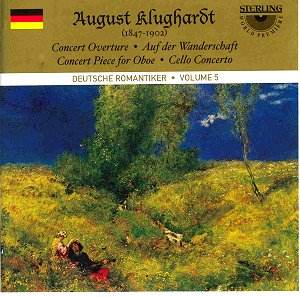Klughardt
was born in Cöthen from a musical family. His debut concert
had him playing Mendelssohn's G minor piano concerto. He studied
later with Blassmann and Reichel in Dresden. A stream of piano
miniatures soon made way for Dornröschen for soli,
chorus and orchestra; presumably much in the tracks of Schumann's
secular cantatas Roserpilgerfahrt and Manfred. He
held various posts at Lübeck, Weimar and Strelitz. There
are at least two symphonies as well as five overtures, operas,
oratorios, chamber music and a violin concerto.
Klughardt's
style is very consistent across the present four works. The frame
within which he wrote was effectively set by an amalgam of the
pictorial Schumann (Second and Third Symphonies) and the rural
style of DvořŠk. The Concert Overture sports some
spry work for the french horns as well as the flighty charm of
Schumann. The Oboe Concert Piece is a striking and somewhat
melancholy reflection in DvořŠk's style. It works extremely
well. There is no Brahms in this mix. The brief single movement
Cello Concerto is warm and rounded rather like a DvořŠk
middle movement. The Auf Der Wanderschaft suite
is in six movements with much rural chivalry, sylvan glades and
cuckoo calls. This is in the same sphere as DvořŠk's American
Suite, Wind Serenade and Ludolf Nielsen's orchestral
suites all laced with a dash of Schumann (Rhenish) and
Mendelssohn (Scottish). Klughardt does not aspire to high
drama. This is the mulch from which the Ďwaldwebení magic of Mahler's
First and Fourth Symphonies grew.
The
recordings are taken from two German radio station archives and
sound at least respectable if not up to the standards of transparency
expected of modern digital articles.
Undemanding
rural fare with a woodland romantic accent sometimes glancing
eastwards towards Bohemia.
Rob Barnett
STERLING'S GERMAN ROMANTICS series
Wetz
Symphony No. 3 CDS-1041-2
Burgmüller
and Staehle Symphonies CDS-1046-2
Büttner
Symphony No. 4 CDS-1048-2
Schulz-Beuthen
Symphony No. 5 CDS-1049-2
